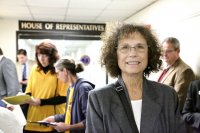National Popular Vote: the majority should decide

For most of us, the night of Nov. 8, 2016 will be seared into our memory forever. Donald Trump had won the presidency.
It became clearer in the following days that Hillary Clinton had received three million votes more than Donald Trump. But he had won more votes in the Electoral College and thus he would become our president.
This enigma prevailed because 48 out of our 50 states support winner-take-all regarding the votes of the delegates to the Electoral College, which convenes in the December following the November election. Thus, in Kentucky, Donald Trump got 100 percent of our Electoral College votes despite winning only 63 percent of the individual votes.
Had our Electoral College votes been divided proportionately, Trump would have gotten five and Clinton would have received three. If every state had done that, Clinton would now likely be our president.
As the United States Constitution allows each state to decide how its delegation to the Electoral College will cast its ballots, our General Assembly has passed the winner-take-all policy in Kentucky and has the power to change it at any time.
A national movement is spreading for states to change their formulas so that their delegates to the Electoral College will unanimously vote for the candidate who has won the most popular votes nationally. This movement is called the National Popular Vote. It has been enacted into law in 12 states already, for a total of 172 electoral votes. But it will not take effect until enough states have passed it to equal a majority of the electoral votes, 270.
The bill was introduced into the Kentucky House of Representatives in 2009, with 12 cosponsors. It was not passed into law, despite 80 percent of the voters in Kentucky being in favor of it, according to a survey taken in 2008.
Although at first glance Republicans seem to benefit from the winner-take-all laws, there are several reasons why Republicans would support a National Popular Vote bill in their states.
First, on its face, the current prescription may result in an unfair outcome. We are a democracy. Despite the manipulations of candidates to go after votes in the Electoral College, the popular vote outcome is apparent to everyone after the election.
Second, the presidential candidates shower many more benefits on the toss-up states than the rest of the states, in which the outcome seems to be a foregone conclusion. Compare how many times Barack Obama, Mitch Romney, Hillary Clinton and Donald Trump appeared in Ohio as opposed to Kentucky.
In 2008, a National Popular Vote bill was introduced in the Kentucky General Assembly by Rep. Ruth Ann Palumbo. It was approved by the House Elections, Constitutional Amendments &
Intergovernmental Affairs Committee but then killed by House leaders.
The same happened in the 2009 legislative session, when the bill had 12 cosponsors. It passed committee and then was allowed to die by House leaders.
The legislation was introduced in the state legislature again in 2011 and 2012 without receiving any action.
They appeared over and over again in Ohio in large urban venues and small town coffee shops from August to November of the presidential election years. The only time I have seen Barack Obama in person was in a football stadium in Cincinnati, never in my home state of Kentucky.
These candidate appearances churn up a lot of economic activity, from the quick breakfasts and lunches gobbled down by excited voters to the guy selling newly printed t-shirts on the sidewalk to hotels for overnight stays. So, whether the visiting candidate is a Democrat or Republican, the venue is a winner economically.
Kentucky has missed out on all this income around the physical presence of the candidates. In addition, the advertisements placed by the presidential candidates on television and radio and in newspapers bring in tremendous revenue. Again, for the most part, Kentucky misses out on that.
There is even a survey that shows that battleground states receive more attention from presidents during their terms in the forms of grants and emergency relief. All of these benefits to a few states will influence the other states to get on board with the National Popular Vote movement.
In most states, Republicans are just as eager as Democrats to reform the Electoral College outcomes, for all of the above reasons. In addition, they can never tell when the shoe might be on the other foot and they would win the popular vote but lose the Electoral College vote.
Michael Steele, former chairman of the Republican National Committee, and Saul Anuzis, former chairman of the Michigan Republican Party, wrote an opinion piece on March 1, 2019, urging Republicans to support the National Popular Vote.
I want my vote to be just as important in a presidential election as a vote in any other state. I want to be wooed by the candidates in a venue close to home and to bring friends to their events. If the National Popular Vote is passed in enough states, it will be so.
Let’s convince our state lawmakers in Kentucky to make this change in our delegation to the Electoral College to avoid future presidents who are inaugurated without winning the national popular vote.
Recent News
Kentucky’s past legislative session showed alarming trend toward government secrecy
Churchill Downs takes more than it gives. That's why the Kentucky Derby is a no-go for me
‘We must never forget.’ Kentucky town installs markers for lynching victims.
Featured Posts
Protecting the Earth
TJC Rolling Out The Vote Tour – a KFTC Reflection Essay
KFTC Voter Empowerment Contractor Reflection Essay
Archives
- Home
- |
- Sitemap
- |
- Get Involved
- |
- Privacy Policy
- |
- Press
- |
- About
- |
- Bill Tracker
- |
- Contact
- |
- Links
- |
- RSS

